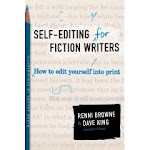I am writing in my hero's POV. He is watching and interacting with a secondary character that he knows pretty well. I write "The woman bristled with unspoken opinion." To me, I believe a POV character can tell when someone is itching to speak. But I've been told this is a POV hop. ~Debra
As we walk around in life, we read emotions from other people all the time, either by their actions or facial expressions. The question is has the hero interpreted that emotion correctly? Perhaps the hero assumes the other character was "bristling with unspoken opinion" and then later discovers that the character had remembered something important that had nothing to do with the situation at hand. POV can lead one character to interpret another character's emotion, or misinterpret that emotion. In the case you describe above, the main character can see that the other character is "itching to speak." This is not a POV jump. All of this is simply the art of storytelling, and "The woman bristled with unspoken opinion" is a creative way to "show" that emotion.
Yes, there are rules to writing fiction (that's why we're here), but we become like Microsoft Word's grammar checker when we strike out every line that "could be" a POV jump, or a line that has one "ly" adverb, or one too many exclamation points, etc.
I was once told that I had an overuse of exclamation points in my text. Normally, I'd agree with this, assuming they were misused. But someone was about to die and three characters needed to shout. It wasn't "wrong," but the contest judge marked it as wrong and docked my manuscript several points. Of course, I griped to Dave about it.
Here's what he said (and I don't believe he minds me quoting him here):
"I've run into the kind of editorial comment you've seen -- mechanical and reflexive. Basically, it's easier to strike out, say, every -ly adverb than to think about when they are appropriate. It's Microsoft's grammar checker trying to do fiction."
As self-editors, as critique partners, and as judges in contests, the question we need to ask ourselves is whether or not the use of that ly adverb, etc, is appropriate. Are people actually shouting? Then use an exclamation point. Are they just excited and not necessarily shouting, then don't use the exclamation point.
The problem with POV hopping is what I explained below. It's to avoid confusion. The statement: "The woman bristled with unspoken opinion" does not create confusion. It does not dislodge the reader, leaving them wondering where they're at in the story. We still know we're in the hero's head, so it's not a POV jump.
Any more questions? I'd be happy to answer them.
I hope this was helpful.
Sunday, October 18, 2009
Subscribe to:
Post Comments (Atom)












Hey, Sandi!
ReplyDeleteThanks for the answer. (ha ha especially when you agree with me) That confirms what I was thinking when I wrote it. I will keep it in mind as I continue, knowing I have other spots where the POV is reading emotion. I just have to be careful.
I like Dave's explanations too. Boy, I can tell you that getting judged entries back from three contests within a two week period really did a number on me. It's as much work to figure out where to go with conflicting comments as it is to keep my voice when 10 others chime in.
It has taken awhile to learn when to accept suggestions and when to put them aside nicely and move on. (Incidentally I may just get some new chapters up on the crit loop and I look forward to your help!)
thanks Sandi!
Debra,
ReplyDeleteI'm glad it was helpful. :-)
Debra and others, we'll talk more about how to accept/deal with critiques of our work in the next post.
ReplyDelete